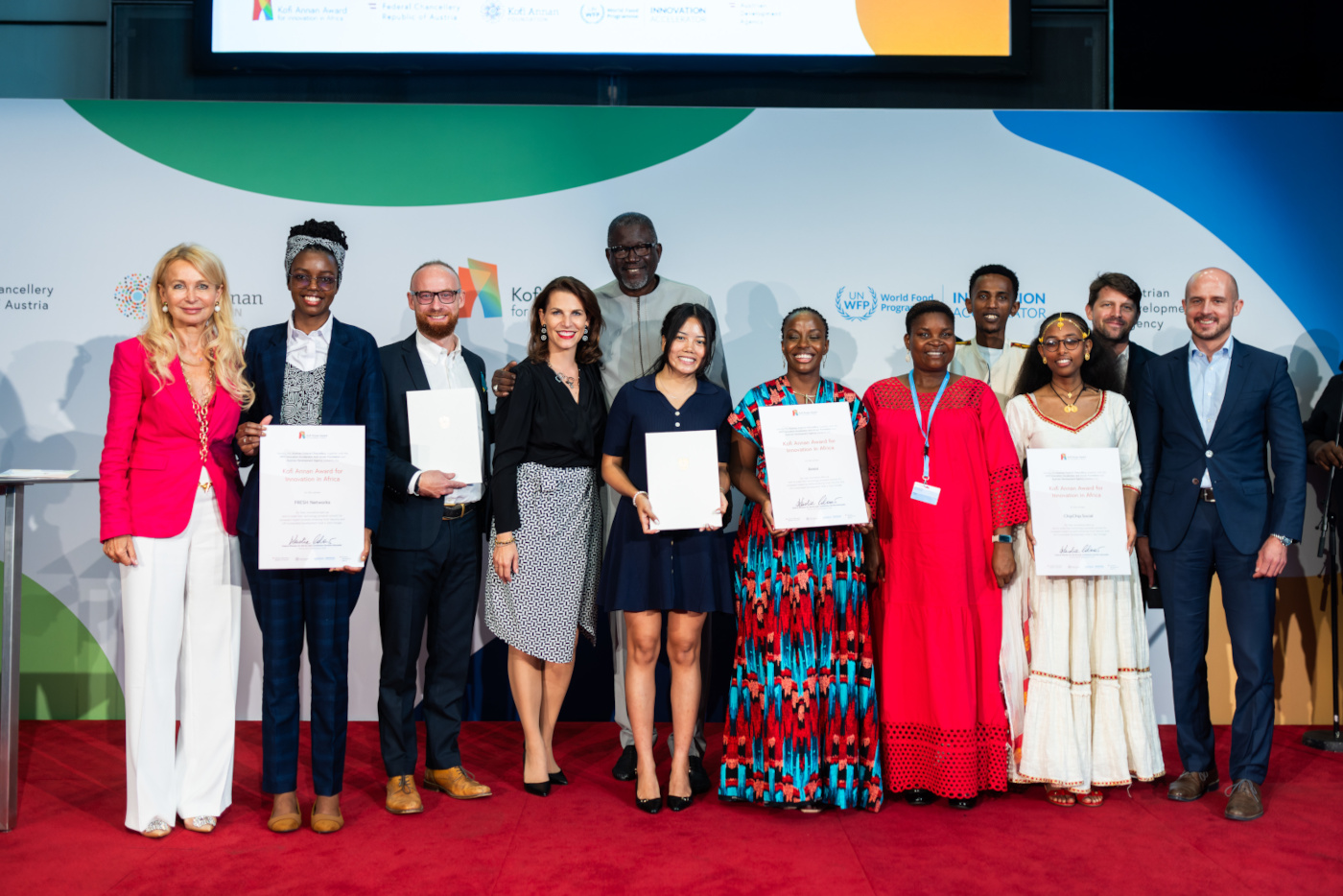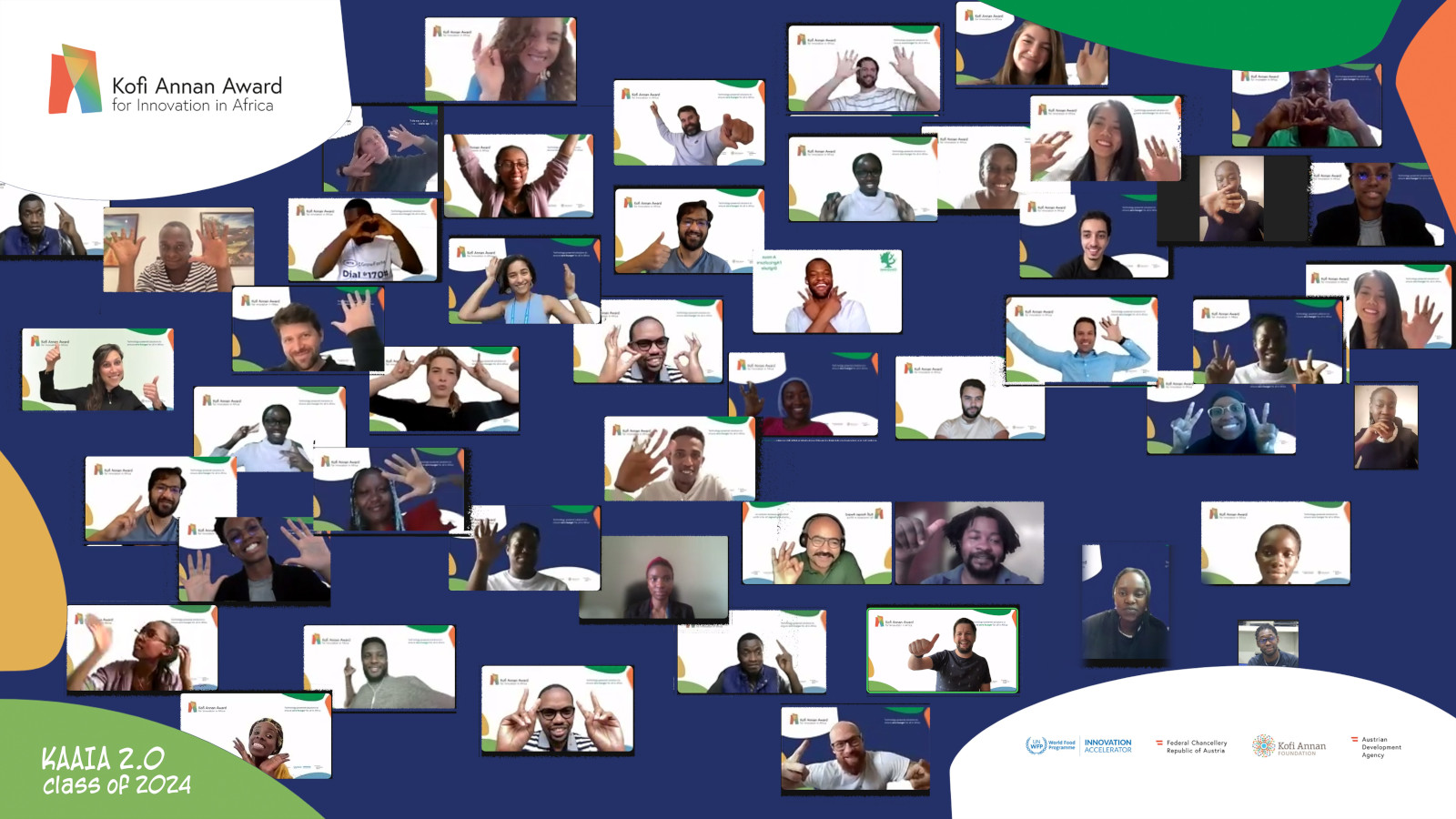About the Winners and Finalists 2023/24
In the course of a successful virtual pitch-event in June 2024, the nine finalist teams, presented their refined solutions one last time in front of the KAAIA High-Level Board of Advisors and Jury and the Innovation Committee (IC). Three teams have won over the Jury and IC members and can now call themselves awardees of the Kofi Annan Award for Innovation in Africa!

The three KAAIA Awardees of 2024
Amini – Solving Africa’s environmental data scarcity to regenerate natural capital through AI and space technologies (Kenya)
Amini addresses Africa's critical data scarcity, particularly impacting agriculture, hindering efforts to minimize post-harvest losses and adopt sustainable practices. The venture provides end-to-end data aggregation and analysis with high accuracy, processing data at scale for diverse lands by leveraging real-time satellite imagery, existing data maps, and clients data. Using AI and ML, it measures crop condition, water stress, soil moisture, and more. To commercialize this technology, Amini built an API that can be integrated with different institutions such as banks, insurance companies, and governmental entities to supply them with high quality data for better assessments and planning. The same data is used to benefit the farmers. Farmers receive farming insights to improve yields (incomes) via a smart SMS system for free.
ChipChip.Social – Innovative farm-to-fork model and tech-enabled ‘group-buying’ to streamline inefficient food supply chains (Ethiopia)
Long and fragmented agricultural supply chains impact smallholder farmers, food businesses, and urban consumers in Ethiopia. Smallholders struggle with market access and price volatility, leading to inefficient production and spoilages. Businesses rely on fresh produce but face delays and inflated prices, burdening consumers, especially those in low-income households. ChipChip optimizes the supply chain from farm to consumer. Firstly, it utilizes a "social/group buying" model, aggregating demand to enable smallholder farmers to sell bulk agri-foods directly to consumers at discounts of over 20%. Secondly, by leveraging its mobile app, ChipChip matches orders with gig drivers for fast delivery to the group that’s buying, significantly reducing warehouse and logistics costs. This innovative approach fosters producer-consumer linkages, decreases costs for households, creates jobs, and unlocks value along agricultural supply chains.
FRESH Networks – Making safe, high-quality milk affordable for underserved, low-income urban households in Kenya (Kenya)
Most of the 3.8 Mio. low-income urban households in Kenya buy loose milk from informal retailers in their neighborhoods, as packaged milk typically cost 30-40% more. These loose milk channels are unregulated and the supply is untraceable, putting consumers at risk of milk-borne health hazards or forgoing a vital source of nutrition, especially for children. FRESH Networks offers low-income urban Kenyans safe and high-quality milk at affordable prices via a network of smart milk dispensers supported by an IoT-enabled supply chain. FRESH sources pasteurized milk from reliable dairy companies and transports it to automated milk dispensers placed inside micro-retailer partners’ shops in lower-income neighborhoods. Customers can buy any amount of milk using a digital token system. All inventory, payment and logistics data is tracked via the FRESH Cloud system, maximizing quality, availability, and affordability for consumers, and efficiency and reach for dairies.
The six KAAIA finalists of 2024
Grow For Me – Connects farmers, funders, and markets, transforming agriculture with digital solutions for impact (Ghana)
Grow For Me developed a crowdfunding platform that connects investors with specific farms or commodities. Leveraging a Micro Aggregator Platform with USSD technology, Grow For Me facilitates commodity aggregation, trading, and instant payment. This ensures fair prices for farmers, reduces post-harvest losses, and streamlines the trading process. Their innovative approach relies on the use of technology like satellite images to track farms for investors, and a USSD platform which makes it easy for anyone with a mobile phone to join. Unlike other platforms, they don't own farms or warehouses, making them asset-light and cost-effective for scalability.
Joklante – Effective communication, outreach and information-sharing in hard-to-reach agricultural contexts (Senegal)
Joklante addresses the challenge of limited information access for rural Senegalese farmers, exacerbated by underdeveloped digital infrastructure and low French literacy rates. By democratizing access to climate and market data, the platform aims to strengthen local food value chains through tailored communication. With over 70% of the population engaged in agriculture and 95% of farms being smallholdings, Jokalante seeks to provide all Senegalese farmers with vital data in 6 native languages for informed decision-making. Jokalante offers a robust SAAS platform which offers a suite of packages to partners based on their requirements (public/private sector or government). The tools they offer facilitate direct and effective connection with highly remote populations across all 14 sectors in their own languages.
Karpolax – Prolonging freshness with cutting-edge green nanotech for healthier produce and longer shelf life (Uganda)
Karpolax addresses the global challenge of post-harvest losses in the agricultural sector by leveraging green nanotechnology to extend the shelf life of fruits and vegetables. Karpolax has developed sachets containing polymers which diminishes natural degradation of fruits. The sachets work by inhibiting the release of the enzyme Phospholipase D which is responsible for senescence. Adding a sachet to a box of fruit helps the produce to stay fresh longer and can maintain nutrient quality for up to 33 days. These polymers are synthesized naturally and the relevant ratios are patented in Uganda. Karpolax works by having different sachet for each type of fruits. So far they work with mangos, bananas, oranges and berries, and working on developing sachets for tomatoes and avocados.
KivuGreen – Platform that connects smallholder farmers to markets and agricultural information without an internet connection (Dem. Rep. Congo)
KivuGreen is a solution solving the challenge of small-scale farmers' limited access to agricultural markets and information in the Democratic Republic of Congo (DRC). The platform uses artificial intelligence to provide real-time information on weather, market prices and farming advice via mobile phones. It levarges USSD technology to enable farmers access to data without internet connection, and voice technology in local languages to provide essential information for illiterate farmers. By using common SMS technologies and telephone calls, KivuGreen is considered a low-cost solution, facilitating large-scale implementation.
Mama Pesa – Empowering affected women and those at risk from marginalized communities to attain financial independence (Kenya)
Mama Pesa is a financial inclusion mobile app technology, enabling the participation of women in agriculture and food production by providing access to financing for farm inputs, inventory, as well as climate-smart equipment and machinery. It establishes direct connections between women entrepreneurs and an extensive network of manufacturers, wholesalers, and key suppliers. This enables Mama Pesa to deliver personalized smart asset matching, complete with affordable saving plans, loan options, and payment schedules. MamaPesa's innovation lies in its unique combination of AI, financial inclusion, and rural accessibility. Unlike traditional loan models that often exclude women due to a lack of collateral or formal documentation, MamaPesa leverages technology to create a more inclusive and flexible system. The USSD platform further sets them apart, ensuring no woman is left out due to limitations in technology access.
Solerchil Technologies Ltd – Renting solar powered cold rooms and linking nearly-expired unsold food to buyers (Uganda)
Solerchil is a venture that manufactures, rents out, and sells solar-powered cold rooms to organized groups of food market vendors, farmers and food dealers to help them safely preserve their unsold food. Members of groups who purchased/rented the cold room can store their unsold food in these cold rooms and have the option to upload the food that is near expiring onto Solerchil’s chatbot. Then, buyers interested in purchasing healthy, nearly expired food can then place orders for any quantity, after which the seller either delivers it directly or the buyer collects it from the seller.
